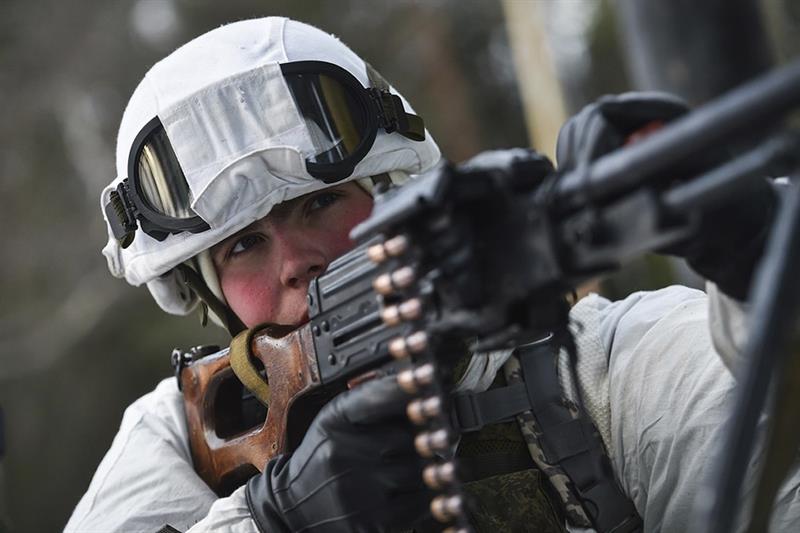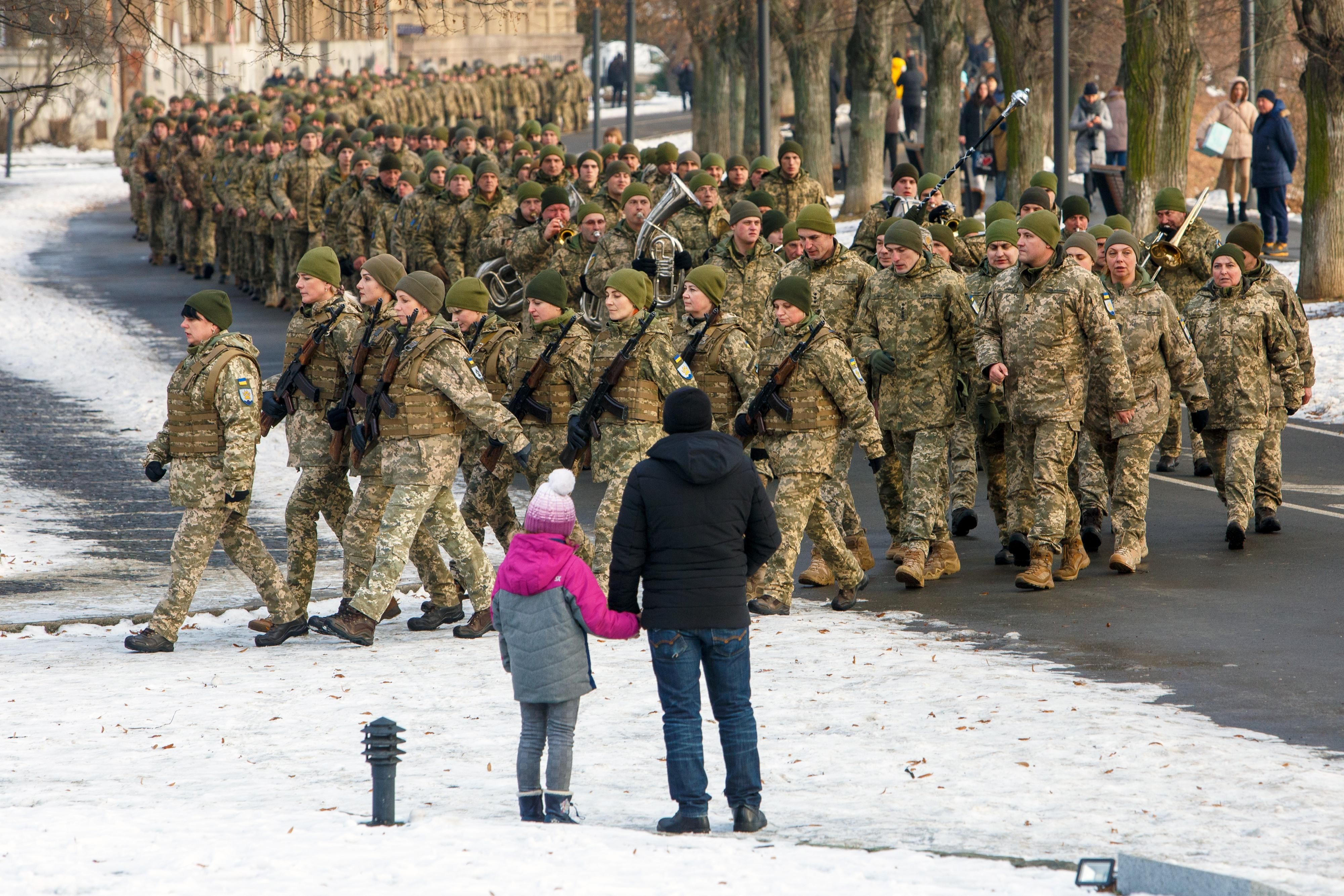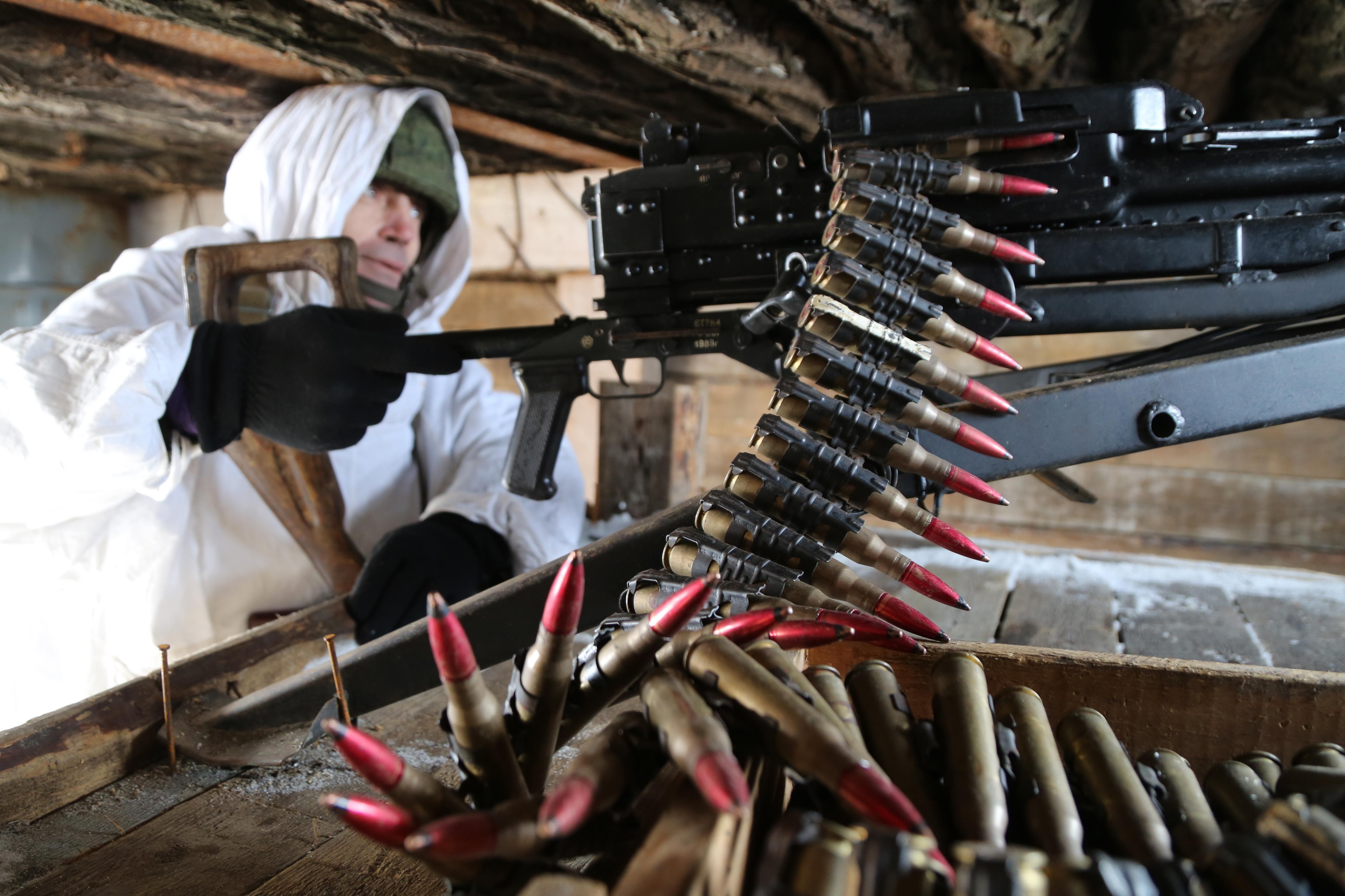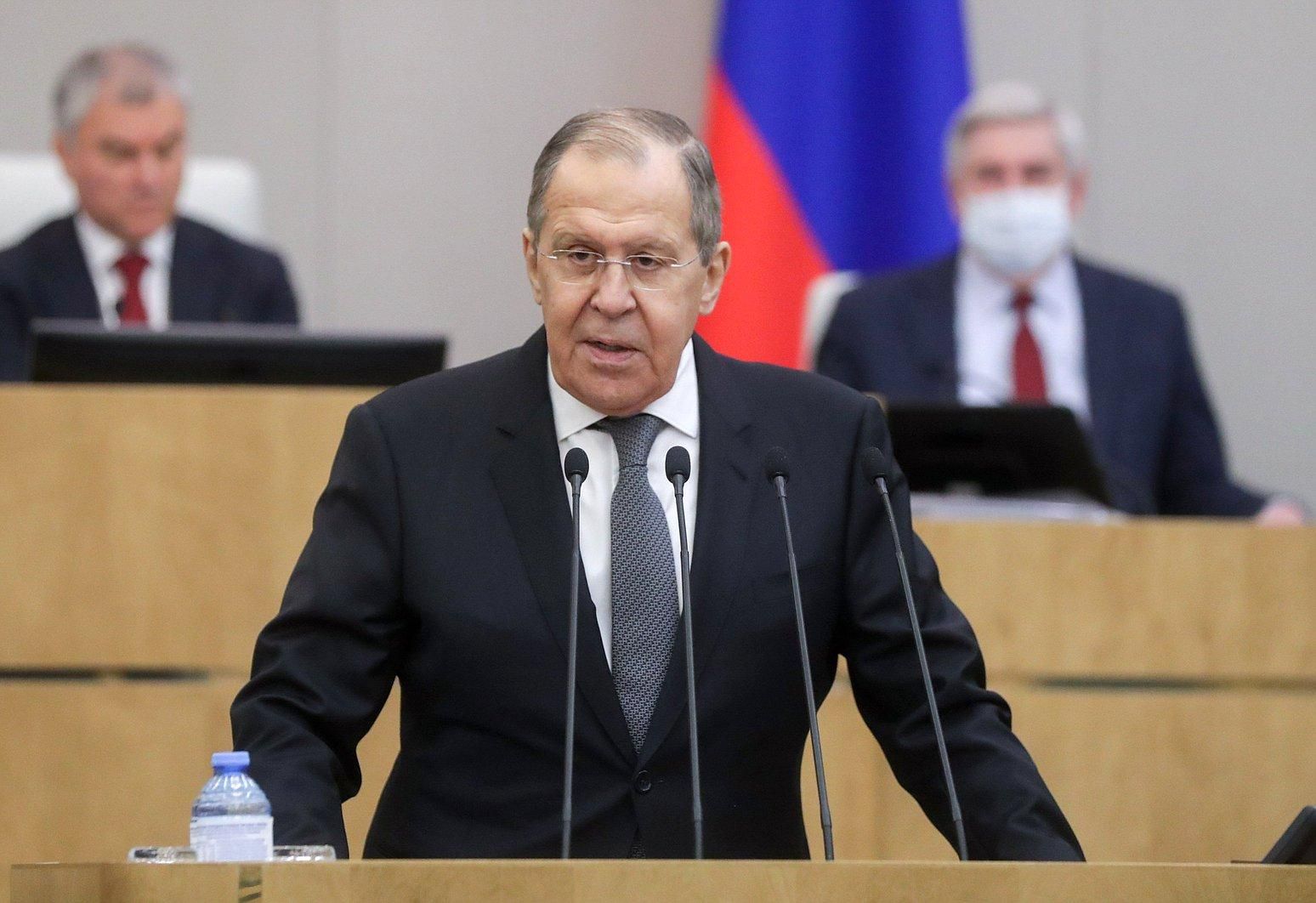FROM MY EMAIL
|
It’s possible that I shall make an ass of myself. But in that case one can always get out of it with a little dialectic. I have, of course, so worded my proposition as to be right either way (K.Marx, Letter to F.Engels on the Indian Mutiny)
FROM MY EMAIL
|
A Russian lawmaker is encouraging residents of the rebel-controlled areas of Ukraine to join the Russian army, a sign that Moscow is continuing to try to integrate those territories as much as possible amid Western fears that Russia is planning to invade Ukraine.

Viktor Vodolatsky said Saturday that residents of the regions controlled since 2014 by Russia-backed rebels fear assaults by Ukrainian forces and that those who hold Russian passports would be welcomed in the military.
"If Russian citizens residing in the (territories) want to join the Russian Armed Forces, the Rostov regional military commissariat will register and draft them,'' Vodolatsky, deputy chairman of the parliament committee on relations with neighbours, told the state news agency Tass.
Russia has granted passports to more than 500,000 people in the territories. Vodolatsky said the recruits would serve in Russia, but that leaves open the option that they could join any future invasion force.
Russia has massed an estimated 100,000 troops near Ukraine. U.S. Defense Secretary Lloyd Austin said Friday that President Vladimir Putin could use any portion of the force of an estimated 100,000 troops to seize Ukrainian cities and "significant territories'' or to carry out "coercive acts or provocative political acts."
Russia denies that it is planning an invasion, but contends that Ukraine poses a security threat and is demanding that NATO promises never to allow Ukraine to join the alliance, as well as stopping the deployment of alliance weapons near Russian borders, and rolling back its forces from Eastern Europe.
The U.S. and NATO formally rejected those demands this week, although Washington outlined areas where discussions are possible, offering hope that there could be a way to avoid war.
The Russian president has made no public remarks about the Western response, but Foreign Minister Sergey Lavrov said it leaves little chance for reaching an agreement.
"While they say they won't change their positions, we won't change ours,'' Lavrov told Russian radio stations in a live interview. "I don't see any room for compromise here.''
"There won't be a war as far as it depends on the Russian Federation, we don't want a war,'' he added. "But we won't let our interests be rudely trampled on and ignored.''
A senior offical in President Joe Biden's administration said the U.S. welcomed Lavrov's comments that Russia does not want war, "but this needs to be backed up with action. We need to see Russia pulling some of the troops that they have deployed away from the Ukrainian border and taking other de-escalatory steps.'' The official spoke on condition of anonymity because he was not authorized to talk publicly.
Lavrov said the U.S. suggested the two sides could talk about limits on the deployment of intermediate-range missiles, restrictions on military drills and rules to prevent accidents between warships and aircraft. He said the Russians proposed discussing those issues years ago, but Washington and its allies never took them up on it until now.
He also said those issues are secondary to Russia's main concerns about NATO. He said international agreements say the security of one nation must not come at the expense of others and said he would send letters to Western counterparts asking them to explain their failure to respect that pledge.
Washington has warned Moscow of devastating sanctions if it invades Ukraine, including penalties targeting top Russian officials and key economic sectors. Lavrov said Moscow had warned Washington that sanctions would amount to a complete severing of ties.
NATO, meanwhile, said it was bolstering its deterrence in the Baltic Sea region.
Russia has launched military drills involving motorized infantry and artillery units in southwestern Russia, warplanes in Kaliningrad on the Baltic Sea, and dozens of warships in the Black Sea and the Arctic. Russian troops are also in Belarus for joint drills, raising Western fears that Moscow could stage an attack on Ukraine from the north. The Ukrainian capital is 75 kilometres (less than 50 miles) from the border with Belarus.










How species manage to thrive in polluted ecosystems
The devastating damaged caused by environmental pollution is well-known. Yet some creatures have managed to adapt to live with, and even thrive in, imperfect environments.
Industrial pollution of a lagoon in Argentina: A small number of animals can thrive
under unlikely conditions like this
In a world where human-made pollution in the form of smog, industrial sewage, fertilizer runoff, dense blankets of ocean plastic and much more pervades the planet, many animal and plant species are up against it.
But there are some species that have found ways to live with, and indeed adapt to the pollution that has come to characterize their once clean surroundings.
A team of researchers from Chalmers University of Technology in Gothenburg, Sweden, made a surprising discovery last year, when they found that microbes living in oceans and soils worldwide can evolve to eat plastic — especially if they live in ecosystems with a high level of plastic pollution.
In analyzing microbial DNA samples collected from hundreds of locations across the globe, the researchers found over 30,000 different enzymes that could degrade 10 kinds of plastic.

A lot of our plastic ends up in the oceans and washed up on beaches
While some of these enzymes had already been identified in bacteria living in rubbish dumps, the vast majority were unknown. Even more impressive was the finding that the amount and type of enzymes discovered in the samples matched the volume and type of plastic pollution in the locations they were taken from.
The microbial DNA collected in oceans, for example, showed more plastic-degrading enzymes at deeper sea levels where the degree of plastic pollution is generally higher. According to the study, this suggests "that the Earth's microbiome might already be adapting to current global plastic pollution trends."
With millions of tons of the stuff being dumped in the environment every year, the microorganisms apparently face "sufficiently strong selective pressures" to develop those plastic-digesting enzymes.
Last year's findings are not the first to show species adapting to environmental pollution.
In the mid-1800s, a decade before Charles Darwin's evolutionary theory was published, residents in increasingly industrial English cities like London and Manchester observed an unexpected color change in the peppered moth.
The insect had been characterized by its mottled white body and wings — a pattern used to camouflage the nocturnal animal during daylight hours when it would rest on tree trunks and walls. But as industrialization and resulting air pollution intensified, a genetic mutation that produced an entirely black version of the peppered moth began to spread within the species.

The distinctive pattern of a peppered moth — one which did not evolve to be black
Known as "carbonaria," these moths were able to hide from hungry birds more easily in the blackened industrial landscapes.
While the white peppered moth remained the common form in the countryside, the carbonaria moth had become the dominant variant in the Manchester region by 1900.
Genetically adapting to highly polluted habitats can clearly be an evolutionary advantage. But evolving the ability to exist in a polluted environment often comes at a cost. While certain changes in the genome may help a species withstand a specific pollutant, they can make the species more vulnerable to other environmental stressors.
This is the case for the killifish — a small, silvery fish found thriving in toxic waters along the northern Gulf of Mexico and North America's Atlantic coast.
High concentrations of heavy metals, dangerous chemicals released from industrial waste and residuals from the production of herbicides like the infamous Agent Orange have turned these waters deadly for vertebrates. The polluting substances can disrupt embryo development, causing deformations and heart defects, or prevent them from hatching at all.
Although killifish are generally sensitive to brackish water, a study on the Atlantic killifish led by Andrew Whitehead from the University of California Davis suggests that "even at the most contaminated of these sites, where killifish are not expected to persist, they appear to thrive."

Some killifish species are now used to living in highly polluted waters
The populations living in the contaminated areas along the Atlantic and the Gulf coasts carry a genetic variation that makes them resistant to the disastrous effects of the toxic chemicals. Thanks to their genome, the fish can withstand a chemical pollutant concentration that is thousands of times higher than the normally deadly dose.
While this genetic change has made the killifish more resistant to toxins, it has also reduced the species' tolerance to low oxygen levels. That's a problem as oxygen levels in the sea vary, and as global temperatures rise, ocean oxygen is expected to decline drastically. Once water has been cleaned of pollutants, the adapted fish may have greater difficult surviving than those without the variation.
Most animal and plant populations will not be able to adapt genetically to their polluted surroundings at all. It has only worked for a few out of millions of species.
What allowed the microbes, moths and killifish to adapt to high pollution levels is a rapid reproduction rate as well as incredibly large population sizes — the killifish, for example, is the most populous animal species with a backbone in many urban estuaries.
A species with a large population is much more likely to develop genetic mutations that happen to increase resistance to environmental stressors. But most species under threat from toxins don't have the population size to develop adequate mutations. Cleaning up polluted sites and avoiding pollution in the first place is the only way to save them.




